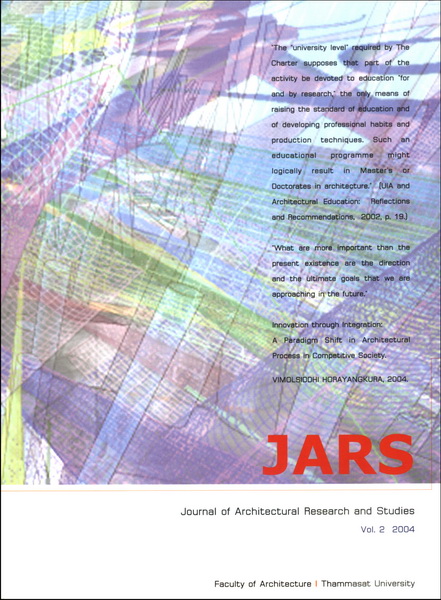Sustainable Building Assessment
Main Article Content
Abstract
Constructions during past decades have created environmental problems, which become unbearable intoday world society. It is clear now that, if we can not delay or stop the increment of green house effect, major cities willsooner be under sea level. In the past decade, “green building” concept has been introduced, with goal to promoteenergy saving building. There are assessment tools such as BREEM, LEED and GB Tool that were developed toevaluate level of green building. However, these assessment systems are not comprehensive, especially on environmentalissues. The word “sustainable building” is becoming more comprehensive, with aim to cover also quality of life, safety,and internal and external environment. There are also more talks related to social and economic development.
The Comprehensive Assessment System for Building Environmental Efficiency (CASBEE) has been developedand becoming popular among Asian countries. China, for example, has applied the system for the development ofGreen Olympic 2008. Singapore has been applying the system to control building construction, and has been welladvanced on the management of construction waste. Japan has been developed the system to regulatory level. Theassessment system will also be used to mark value of the building in the future. Building with “Sustainable Building”mark will be more valuable. The architect and engineers should be aware of such assessment system, and designbuilding to achieve high score. The same principle will be applied for the development of “Sustainable City.” SB05Tokyo Conference in 2005 will be another international venue with goal on action for sustainability.
Building owner should understand about Building Life Cycle. Investment in real estate has increased in valuewhen time passed. But this belief is not always true. It has been proved that only quality building has higher valuethrough time. To maintain value of the building, the building owner has to renovate or upgrade building continuously.
Sustainable development has increasingly become the new direction for future commercial buildingdevelopment, which includes new standard on environment, energy and safety. The CASBEE uses hypotheticalboundary to define building with assessment category “Q” as positive impact inside boundary and category “L” asnegative impact outside boundary. The value of “Q” and “L” will be used on the rating chart and will determine the levelof sustainable building.
There is also specific assessment system for Building Energy Efficiency, and Building Safety.
Building developer may find these new and coming assessment systems as adding cost to construction, andbuilding management. But these assessment system also differentiate quality building and provide value added.More important, the building assessment system is the necessary measure for sustainable development.
Downloads
Article Details

This work is licensed under a Creative Commons Attribution-NonCommercial-NoDerivatives 4.0 International License.
All material is licensed under the terms of the Creative Commons Attribution 4.0 International (CC-BY-NC-ND 4.0) License, unless otherwise stated. As such, authors are free to share, copy, and redistribute the material in any medium or format. The authors must give appropriate credit, provide a link to the license, and indicate if changes were made. The authors may do so in any reasonable manner, but not in any way that suggests the licensor endorses you or your use. The authors may not use the material for commercial purposes. If the authors remix, transform, or build upon the material, they may not distribute the modified material, unless permission is obtained from JARS. Final, accepted versions of the paper may be posted on third party repositories, provided appropriate acknowledgement to the original source is clearly noted.
References
Japan Sustainable Building Consortium. Comprehensive Assessment System for Building EnvironmentalEfficiency – CASBEE. http://www.ibec.or.jp/CASBEE/ , [access date พฤษภาคม 2547].
The 2005 World Sustainable Building Conference.http://www.sb05.com, [access date พฤษภาคม 2547].
The Asian Forum Conference. http://www.asian-forum.net, [access date พฤษภาคม 2547].


